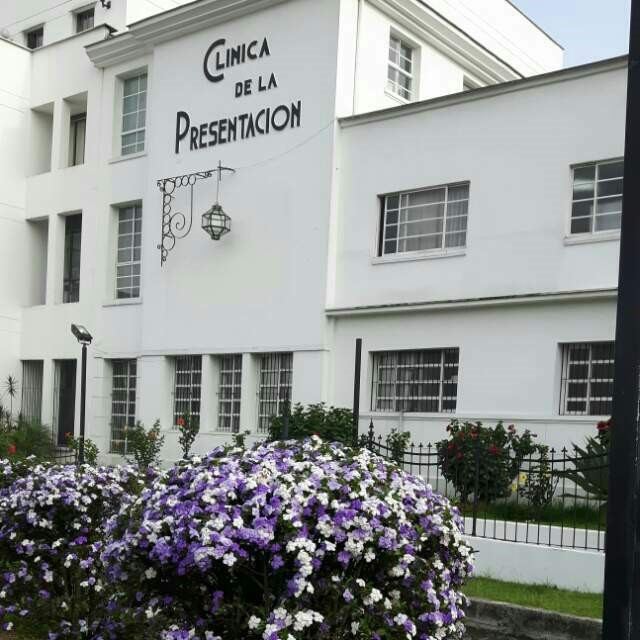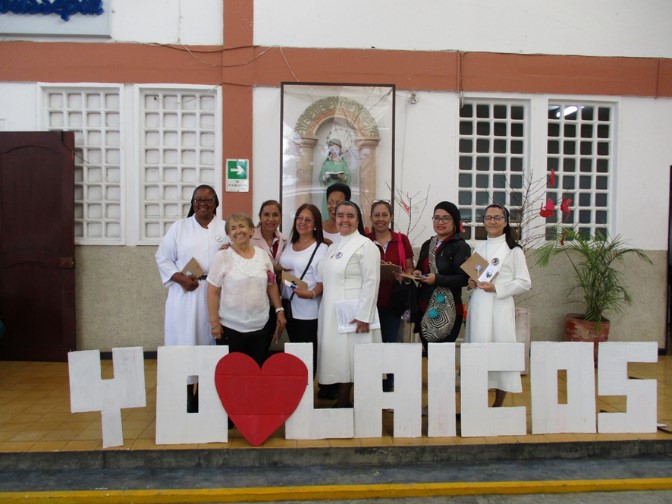Province of Manizales
Historical Review
The Province of Manizales was born after a discernment by the General Government about the Congregation´s development in Colombia as written Sr. Therese Augusta in the circular letter of April 20th 1952, “The Provinces have so spread-out, so overflowing with missions that a transformation seems to be heeded ".

Manizales
Then began the construction of the building that would be the headquarters of the Province in the neighborhood of "La Francia, Manizales", thus continuing the development of the Province. In January 24, 1955, commemoration day of our Mother Foundress´s death the Novitiate was opened. The Province has suffered several blows caused by nature´s fury: in the year 1979 just after celebrating its 25th anniversary, an earthquake destroyed the Provincial House in Manizales. Searching for a new place for the Province Headquarters, Cali was chosen, since it is equidistant from all the communities. In December 2001, again the Province was shocked by an airplane accident where three of our Sisters died, among them, Sr. Elena Barrios P., Provincial Superior at the time. A terrible experience but where the buried seed bears much fruit.
Through our history, there has been ten Provincial Superiors. Their openness to God´s Word, spirit of entrepreneurship, commitment, dedication and listening aptitude have given the drive and dynamism needed over the years to respond to the calls of the Church. In the last five years, some works of our different missionary presences have had to be closed, because we did not have enough sisters to provide these services.
The Province has had the desire of being a “Province of open doors”, very attentive to the motions, inquiries and proposals that have been proposed to us by the General Chapters and by the Enlarged General Council. The process of Revision and Renewal of our Missionary Presence has been carried out, with the contribution of each and every one of the sisters, whom through different organisms of participation have contributed to the construction of the new missionary map of the Province as well as to the administrative and secretarial administration, according to the guidelines of the General Treasurer and the General Secretariat. The Province has had as an ongoing concern to give quality of life to our elder sisters, because thanks to their faithful and generous dedication, we have achieved to be what we are today and what we have; because of this, the Province has reorganized and invested in the communities where they live.
How many are we in 2019? Where we are? What missions do we have?
Today we are approximately 195 sisters in 23 local communities, distributed in three countries:
- Colombia: 19 communities, 181 sisters;
- Ecuador 2 communities, 6 sisters;
- Brazil: 2 communities, 7 sisters.
Our pastoral activities are developed primarily in the following institutions: A Clinic, seven private schools, a University and an Official Kindergarten. We must also emphasize the different presences at the parish and missionary levels, inserted among the poorest. At this time the Province has in initial formation three postulants and two novices.
Adjustments and Advances in our missions
- For the adjustments and advances in the reorganization of our mission, first of all, the sisters were asked to create the New Missionary Map of the Province, starting from THE REALITY of each sister and community until reaching a map of the province; we move forward with some decisions in coherence with the new missionary map and we try to strengthen some "significant experiences" as recognized by the communities and the members of the Expanded Provincial Council.
- Secondly, the exercise of elaborating the Missionary Map of the Province, from all the missionary maps developed by each sister and community, strengthened our sense of belonging which resulted in a more solid work, more collective and with greater impact in the different fields of mission It was a dynamic experience of our missionary life and we believe it can be a contribution to the process of restructuring the Congregation. This work made possible the empowerment and emergence of new initiatives.
- Thirdly, a culture of planning and evaluation was created in the Province, which in turn favored and enriched our strategic planning of the same, gave sustainability to the actions carried out and had as a base line our Project and Statute, to guarantee a common dynamic. The same methodology ensured that the Project was a permanent reference point in the processes lived by the Province and each local community.
Evidence of Achievements
- Favorable atmosphere in the Province for participation, fraternity, openness and mutual support.
- Humanizing the relationships through the practice of mercy, forgiveness and being present to each other... All this as the result of deepening the Dominican Spirituality of Marie Poussepin.
- Increase in networking initiatives among the different missions of the Province.
- Strengthening of missions by: consutations, investments and training.
- Impact of alternative therapies in the mission: parishes and educational communities.
- Attention and dedication to the older sisters at all levels.
- Sustainability of the biblical school and incidence in the formation of Sisters and Laity.
- Advances in agreements between structures, in view of a better quality in initial formation with a more congregational vision: interprovincial novitiate.
- Lay Dominicans Presentation with their own project, formation plan and apostolic project; we currently have 14 consecrated lay people who live their Christian commitment according to the Spirituality of Marie Poussepin.

Presentation Laity
- Presence in social and parish ministry, in seven places: 4 in Colombia, 2 in Brazil and 1 in Ecuador, some of these works are supported by public and private entities.
- We highlight, as advances and achievements, our work with others: alliances and shared projects (human and financial resources) where we have been able to deploy a wide-rang of training, support and development work with children, young people, women and the elderly of vulnerable population
- Openness and commitment on the part of each community to welcome the new generations.
These are some advances and challenges in this process of transformation to which the Spirit constantly summons us so that our Charism may continue to be a gift and good news for the world.
The following achievements demonstrate in some way the aforementioned:
- Permanent attitude of renewal in the Province.
Systematization of practice in the revision and missionary presence
Sustainability of some changes initiated: participatory environment, a closer government structure, agile, at the service of life and mission, work with others in alliances and networks. - Formation more adapted to current demands. Creation of a Vocational culture through the sustainability of the environment of ongoing humanization, of the relationships worked in the Province.
Style of participative government, of accompanment to the processes of each sister, community and structures of participation.
Integration of communities to strengthen and support community life and mission. - New organization of administration of the Province that helped to speed up and qualify the sisters and laity in the processes of management and review of accounts.
Creation of a fraternal, critical, proactive search environment and contribution to the joint work with other provinces in the dynamics of the Congregation, in the field of health, common guidelines for clinics.
En el campo de la salud, lineamientos comunes para las Clínicas. - Social projects strengthened in the Province through the attention to women who are heads of the family (in Social Works Betania - Manizales, Buesaco - Nariño, Campina Grande - Brazil), to the farmers (Cacao project in Ponce Enríquez - Ecuador, Alexandria - Brazil), the children (home of passage in Buesaco- Nariño and Garden Santa Bernardita- Manizales), Elders (Hogar de Paso Garzón - Huila).
Photo album
Download PDF newsletter




